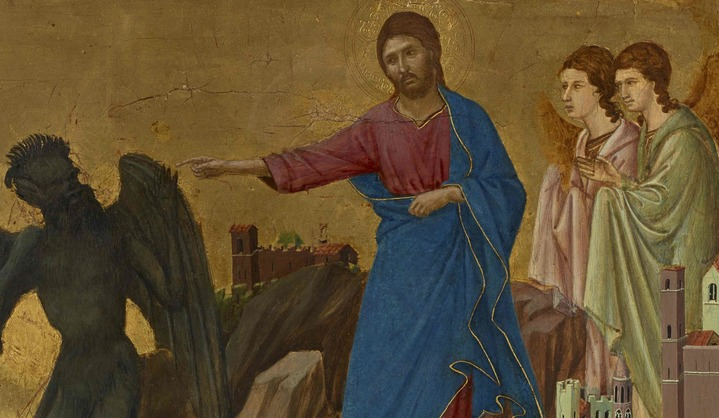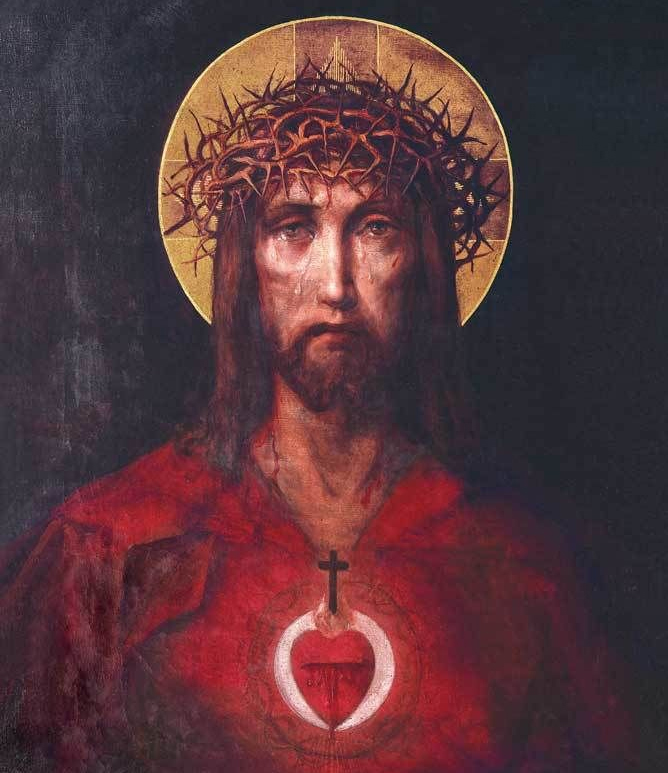Christian Art | Boy At Prayer
Office Of Readings | Wednesday Of Holy Week | A Reading From The Homilies Of Saint Augustine On Saint John’s Gospel
‘The fullness of love in Christ Jesus.’
In this meditation, Saint Augustine leads us to the very heart of Holy Week: the mystery of divine love revealed in the passion and death of Christ. The reading centers on Christ’s declaration from the Gospel of John: ‘No one has greater love than this, to lay down one’s life for one’s friends’ (John 15:13). For Augustine, this is not merely a moving sentiment but the highest expression of divine charity (caritas), the model of love that defines the Christian life.
Measure Of Love | Christ’s Sacrifice
Augustine begins by affirming that the love Christ exemplifies is the standard for all Christian love. Christ’s willing sacrifice of his life is not just a historical event to admire but a living model to imitate. The perfection of love, he says, is found not in affection alone but in self-gift—even unto death. This echoes Augustine’s broader theology, in which love is the driving force of the soul’s ascent to God. True love, for him, is selfless, sacrificial, and rooted in the eternal love of the Trinity.
This teaching finds a powerful parallel in 1 John 3:16—’By this we know love, that he laid down his life for us, and we ought to lay down our lives for the brethren.’ Here, love is defined not by emotion but by action. Augustine reads Christ’s sacrifice not only as redemptive but also as instructive: to love like Christ is to die to self and live for others. This can be martyrdom in the literal sense, but it also includes the daily sacrifices of Christian life.
Table Of The Lord | Eucharist And Martyrdom
A particularly rich section of this reading is Augustine’s allegorical interpretation of Proverbs 23:1–2: ‘If you sit down to eat at the table of a ruler, observe carefully what is set before you…’ For Augustine, this ‘table’ is the Eucharistic banquet, the altar where we receive Christ’s Body and Blood—his life offered for us.
To ‘observe carefully’ means to contemplate the cost of this gift, to realize that communion with Christ is also a call to imitate him. Receiving the Eucharist unites us to Christ’s sacrifice; it demands of us a like response. Augustine provocatively suggests that if we partake in Christ’s table, we must also be prepared to offer the same kind of ‘meal’—that is, to lay down our lives for others in love.
This sacrificial logic lies at the heart of early Christian spirituality. The Eucharist was never just a personal experience of grace; it was always communal and transformative, calling believers into mission and sometimes martyrdom. As St. Ignatius of Antioch wrote on his way to martyrdom: ‘I am God’s wheat, and I shall be ground by the teeth of beasts to become the pure bread of Christ.’
Witness Of The Martyrs
Augustine turns next to the martyrs, those who quite literally provided the same ‘meal’ by offering their lives. He makes a profound distinction between ordinary commemorations of the dead—when the Church prays for the repose of souls—and the remembrance of the martyrs, who pray for us. This inversion speaks to their closeness to Christ, their participation in his perfect love.
The martyrs, for Augustine, are not just exceptional heroes; they are the logical extension of the Eucharist. They responded fully to the gift they received at the altar. Their lives—and deaths—demonstrated that Christian love does not settle for comfort but pushes toward total self-giving. To remember the martyrs rightly is to be inspired by their love, to be drawn into the same pattern of sacrificial living.
Christ Alone Is Saviour
Augustine, always the theologian of grace, is careful to distinguish between Christ’s unique salvific role and our imitation of it. Christ alone could choose the hour of his death; his death was not imposed on him. As the Gospel of John emphasizes, ‘No one takes it from me, but I lay it down of my own accord.’ (John 10:18) Christ’s death is not merely exemplary—it is redemptive, the one sacrifice that forgives sins and conquers death.
No martyr, no saint, no human act can rival that. Even if we shed our blood, we do so only through the power of his death and resurrection. Augustine carefully maintains this Christological humility: while we imitate Christ, we do not save like Christ. Instead, we are grafted onto the true Vine—we receive life from him, not apart from him.
Living The Meal Of The Last Supper
The call to ‘provide the same kind of meal’ is not a call to equality with Christ, but to solidarity with his mission. For most of us, this won’t involve martyrdom in the bloody sense, but it does require a daily dying to self: enduring hardship with patience, forgiving enemies, serving those in need, and living with a love that goes beyond self-interest.
In our time, this message may be more urgent than ever. In a culture often shaped by self-assertion and individualism, Augustine’s vision invites us to a deeper, more radical kind of life—a Eucharistic life. One that sees love not merely as sentiment but as costly gift. In families, in friendships, in communities, and in society at large, we are asked to stretch out our hands at the Lord’s table knowing that we must provide the same kind of meal—a life poured out for others.

A Reading From The Homilies Of Saint Augustine On Saint John’s Gospel
Dear brethren, the Lord has marked out for us the fullness of love that we ought to have for each other. He tells us: No one has greater love than the man who lays down his life for his friends. In these words, the Lord tells us what the perfect love we should have for one another involves. John, the evangelist who recorded them, draws the conclusion in one of his letters: As Christ laid down his life for us, so we too ought to lay down our lives for our brothers. We should indeed love one another as he loved us, he who laid down his life for us.
This is surely what we read in the Proverbs of Solomon: If you sit down to eat at the table of a ruler, observe carefully what is set before you; then stretch out your hand, knowing that you must provide the same kind of meal yourself. What is this ruler’s table if not the one at which we receive the body and blood of him who laid down his life for us? What does it mean to sit at this table if not to approach it with humility? What does it mean to observe carefully what is set before you if not to meditate devoutly on so great a gift? What does it mean to stretch out one’s hand, knowing that one must provide the same kind of meal oneself, if not what I have just said: as Christ laid down his life for us, so we in our turn ought to lay down our lives for our brothers? This is what the apostle Paul said: Christ suffered for us, leaving us an example, that we might follow in his footsteps.
This is what is meant by providing ‘the same kind of meal.’ This is what the blessed martyrs did with such burning love. If we are to give true meaning to our celebration of their memorials, to our approaching the Lord’s table in the very banquet at which they were fed, we must, like them, provide ‘the same kind of meal.’
At this table of the Lord we do not commemorate the martyrs in the same way as we commemorate others who rest in peace. We do not pray for the martyrs as we pray for those others, rather, they pray for us, that we may follow in his footsteps. They practised the perfect love of which the Lord said there could be none greater. They provided ‘the same kind of meal’ as they had themselves received at the Lord’s table.
This must not be understood as saying that we can be the Lord’s equals by bearing witness to him to the extent of shedding our blood. He had the power of laying down his life; we by contrast cannot choose the length of our lives, and we die even if it is against our will. He, by dying, destroyed death in himself; we are freed from death only in his death. His body did not see corruption; our body will see corruption and only then be clothed through him in incorruption at the end of the world. He needed no help from us in saving us; without him we can do nothing. He gave himself to us as the vine to the branches; apart from him we cannot have life.
Finally, even if brothers die for brothers, yet no martyr by shedding his blood brings forgiveness for the sins of his brothers, as Christ brought forgiveness to us. In this he gave us, not an example to imitate but a reason for rejoicing. Inasmuch, then, as they shed their blood for their brothers, the martyrs provided ‘the same kind of meal’ as they had received at the Lord’s table. Let us then love one another as Christ also loved us and gave himself up for us.








